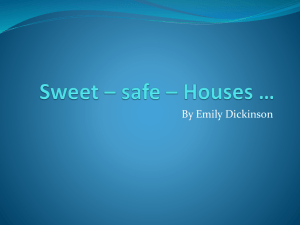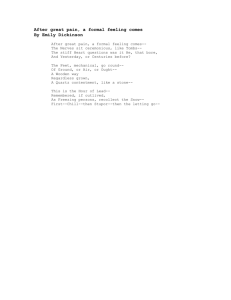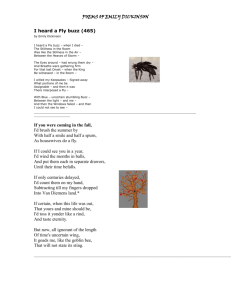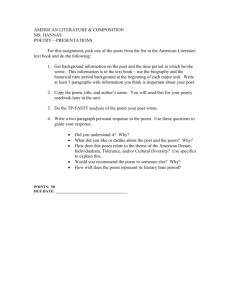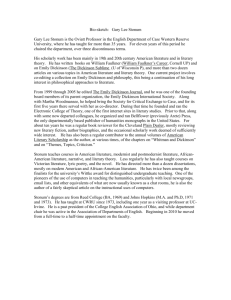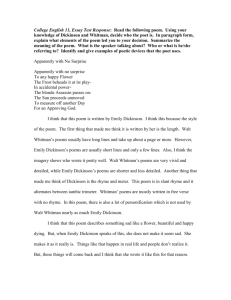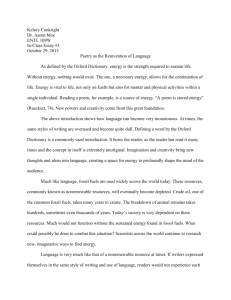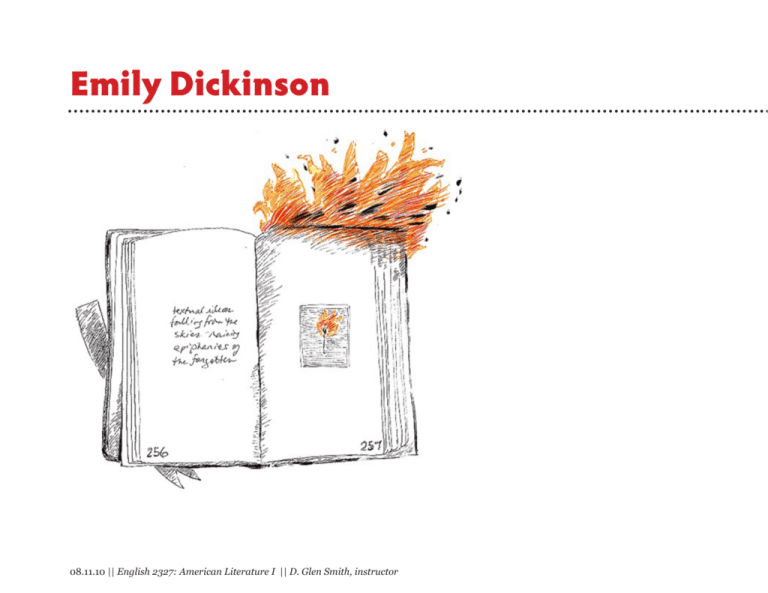
Emily Dickinson
08.11.10 || English 2327: American Literature I || D. Glen Smith, instructor
Emily Dickinson
#249 (“Wild Nights—Wild Nights”)
• Another example of an unusual construction for Dickinson
because she is not resorting to her usual quatrain meter of 4 / 3 / 4 / 3— Instead she has a rough count of two.
2 / 2 / 2 / 2
2 / 2.5 / 2.5 / 2
2.5 / 1.5 / 3 / 1
• Her rhyme scheme is typical to her style: A / B / C / B, and utilizes
perfect as well as slant rhymes.
lines 2 - 4: thee / luxury
lines 6 - 8: port / Chart,
lines 10-12: Sea / Thee
08.11.10 || English 2327: American Literature I || D. Glen Smith, instructor
2
Emily Dickinson
• Likewise, it can be argued that the opening tercet is an example of
trochaic meter, rather than the standard iambic.
>Remember in iambic meter the stress is placed on the second syllable,
whereas in trochaic the stress is placed on the first syllable.
iambic: Shall I / compare / thee to / a sum / mer’s day?
trochaic:
Double, / double, / toil and / trouble.
Fire / burn and / cauldron / bubble!
Wild Nights—Wild Nights!
Were I with thee
Wild Nights should be
Our Lux / ur y
08.11.10 || English 2327: American Literature I || D. Glen Smith, instructor
3
Emily Dickinson
Theme:
• Typically this is understood to be a rather erotic expression of pleasure.
• However, because the overt reading picks up on the obvious imagery, rather
quickly, some critics are careful to point out that Dickinson often will twist
an “obvious” meaning into a more subtle point.
• Like it or not, we live in a post-Freudian world; it is easy to pick up on his
symbolisms in our culture since the Sexual Revolution of the sixties.
• It is important to point out that the poem was written by a recluse during a
pre-Freudian world. Obvious indications of passionate sexuality would not
be as an open declarative to the mid-Victorian mind set.
08.11.10 || English 2327: American Literature I || D. Glen Smith, instructor
4
Emily Dickinson
• Therefore, a point of importance to consider:
did Emily Dickinson purposely choose to write an emotional appeal for
sexual gratification because of the poem’s private nature,
or did she unintentionally embed a poem with repressed sexual desires
or did she intentionally want the metaphor to be seen in a different light
and represent something completely other?
• Part of the discussion lies in the opening stanza, line 4, she uses the word
“luxury”— in modern vernacular the meaning is stated as:
an object representing material goods, wealth, appropriate to sumptuous
living, usually a delicacy, or refinement of living rather than a necessity
In her time however the word was defined as
lust or lechery
08.11.10 || English 2327: American Literature I || D. Glen Smith, instructor
5
Emily Dickinson
• Paul Faris proposes that the usual Freudian sexual images of seas and
mooring can be interpreted to represent more of a security rather than of
untamed, unrestrained passion. He writes:
“Wild nights” in some other poem could suggest stormy, tempestuous love,
to be sure, but here the phrases “in port,” “rowing in Eden,” and “moor”
would be out of harmony, suggesting a peaceful, idyllic mood instead.
In some other poem the speaker could be “done with” compass and chart
because she was abandoning all moral and emotional restraint, but here
she is gratefully done with them because she no longer needs them (271).
In other words, he contends that the speaker is already in port and has
obtained her sense of security; she casts away the instruments of navigation
not because she is wanting to cast off rules and restrictions of her behavior,
but because the Chart and Compass are no longer of any use.
08.11.10 || English 2327: American Literature I || D. Glen Smith, instructor
6
Emily Dickinson
• Most importantly, he points out that most people see the tempest-like
energy in the poem as an example of carnal activity, when in fact Dickinson
states that the Winds are “futile”— in other words, the winds cannot rock the
waves of the port where she is located.
• Another major inconsistency with critical analysis, is trying to determine
how Dickinson defined the notion of Eden; does she perceive the biblical
landscape as an area free of sexual restrictions, or as a location under the
watchful eye of a domineering Fatherly Old Testament figure?
• Faris also compares her use of wind and sea in her other poems and notes
that more often appear destructive forces, rather than mere restrictive
elements.
• He further suggests a rereading of the verse, stressing a passionate love is
involved, but not necessarily a sexual or physical love.
08.11.10 || English 2327: American Literature I || D. Glen Smith, instructor
7
Emily Dickinson
• He sums up the poem to read:
“Stormy nights on the sea of life are buffeting me, and I need thee
desperately,” cries Dickinson. “If I could only be safe in harbor with thee,
the winds howling outside would lose their fearfulness, would even be
welcome, for their futile efforts to get at us would only give us a luxurious
sense of our sufficiency in each other. I would be rowing peacefully with
thee in paradise, no longer depending desperately on compass and chart.
But ah, I do not have thee, and the sea does buffet me. O that I might have
tonight thy protective presence!” (274).
• Another critic, Lilia Melani counters that the poem is primarily about
sexual intercourse; however, she points out this view is from a standpoint
of a hypothetical situation, not a realized one.
(http://academic.brooklyn.cuny.edu/english/melani/cs6/wild.html)
08.11.10 || English 2327: American Literature I || D. Glen Smith, instructor
8
Emily Dickinson
• This is due to the fact Dickinson stresses:
“Were I with thee” and “Might I but moor—Tonight/In Thee!”
• She also points out that the Beloved in the verse could in fact be God.
Another way of reading this poem is as the portrayal of a religious
experience; in this interpretation, the lover is God. Christian mystics ...
often describe the joy they feel while communicating with God in language
which modern psychoanalysts see as sexual; for example, mystics speak of
rapture and ecstasy during their union with God, and they cry out to God,
“stab me” or “pierce my soul, oh Lord.” On the other hand, the number of
feelings human beings can experience and the vocabulary with which they
can express their experiences is limited; using the same language to
describe a spiritual experience and a sexual experience does not
necessarily mean that both experiences are sexual.
08.11.10 || English 2327: American Literature I || D. Glen Smith, instructor
9
Emily Dickinson
• In part the last stanza could acknowledge what Melani suggests; the word
“Thee” is set with a capital letter, unlike the first stanza, which shows the
same word in lowercase.
• Suzanne M. Wilson argues that the persona has experienced knowledge
of physical unions. Her point stresses the notion of how the poem centers
on the aspects of the “breakdown of control and primitive, orgiastic, violent
behavior as well as those of recklessness, delight to the point of distraction,
and complete self-abandonment to passion. The combination of “Wild” with
“Nights” does not limit the meanings in the adjective at all here (353).
• She further argues that Eden is not a representation of religious restriction
but of a paradise with “perfect, intense happiness” (354).
08.11.10 || English 2327: American Literature I || D. Glen Smith, instructor
10
Emily Dickinson
• As a point of reference, the 17th century poet John Milton held the view that
during prelapsarian Eden, God would allow sexual relationships;
procreation would be considered one of the Divine Orders even at this time
in pre-history.
08.11.10 || English 2327: American Literature I || D. Glen Smith, instructor
11
Emily Dickinson
#303 (“The Soul Selects Her Own Society”)
• This verse shows another female persona in control of her environment.
• All three stanzas are in quatrain format and utilize a rhyme scheme of:
A/B/A/B. In this arrangement, all end words have a rhyming partner,
either slant or perfect.
• The meter in the opening line is iambic pentameter, but line two falls back
into a shortened dimeter (two feet). What results is a full count of:
5 / 2 / 4 / 2
5 / 2 / 4.5 / 2
4.5 / 1 / 4.5 / 1
• Notice in each stanza, lines one and three are presented as the longest;
they are displayed as consistently over twice the size of the other lines.
08.11.10 || English 2327: American Literature I || D. Glen Smith, instructor
12
Emily Dickinson
• Line one contains a technique called alliteration. This strategy repeats key
sounds in multiple words. More often the choice reinforces a memorization
of long works for recital. In short poems the technique allows a stronger
sense of rhythm or musical emphasis is to be placed in the work.
The Soul selects her own Society—
• In this case, the line’s theme is emphasized through the alliteration.
The soul, the individual, is shown in control of her choices.
• Because Dickinson utilizes the word “Soul” the stress of the theme is placed
on a more acceptable manner, which some critics point out allows the reader
to relate or connect to the poet-speaker.
08.11.10 || English 2327: American Literature I || D. Glen Smith, instructor
13
Emily Dickinson
• Different parts of the body represent different attitudes, behavioral impulses,
depending on what the poet wants to stress.
heart = love, yearning, emotion
brain = intellect, scientific, reasoning
stomach = hunger, greed, nourishment
male/female genitalia = lust, fertiltiy, reproduction
• In other words, if Dickinson had chosen the Brain as a representation of the
individual, she could come across as vain and proud. The poem would then
take on a stern moralizing tone. (We will talk more on this—see below.)
08.11.10 || English 2327: American Literature I || D. Glen Smith, instructor
14
Emily Dickinson
Theme:
• This verse is utilized to show how selective and reclusive Dickinson became.
It can be argued this defends her right to select only a few, limited friends. • It also seems to present a second possible theme regarding the selection of
a marriage partner. Notice the first stanza frankly details an individual
in control choosing her own “Society.”
• The ending couplet of the first stanza stresses the fact only the selected few
could be considered “her divine” collection of friends. All other individuals
would be excluded. Notice the word “divine” is in lowercase.
> This could imply that the friends are merely mortal and do not merit
capitalization for emphasis, or
> the word stresses the poem’s theme does not relate to religious matters
08.11.10 || English 2327: American Literature I || D. Glen Smith, instructor
15
Emily Dickinson
• Again, other evidence of significant word choices: the use of majority,
versus minority—
> A general definition for “majority” is expressed: more than half.
> However, an arcane definition of the word is superiority.
• It is important to consider, is Dickinson placing an emphasis in the poem
on the people who are welcomed into her realm, or is she emphasizing
the ones who are excluded from her personal society?
• In other words, some argue that the tone of the piece does not come across
as moralizing. Rather Dickinson is merely defending her actions as a
reclusive, selective individual.
• Notice in stanza two, an Emperor arrives, but is not in the elect. In an inverse
situation, he is shown kneeling on her mat before her door, requesting
entrance, which is ultimately denied.
08.11.10 || English 2327: American Literature I || D. Glen Smith, instructor
16
Emily Dickinson
• Apparently, neither class nor wealth are credentials to enter her home.
• Some critics like to point out however, the persona in the poem could be a
representation of an individual who is too exclusive and suffers from
a sin of pride.
• The word choice of “Unmoved” presents a problem: is the persona devoid
of emotions due to vanity or due to anti-social behavior? The word is shown
twice in stanza two. Each time it represents the Soul’s decisions.
• In line three, Dickinson omits subject and verb from line one: “she notes” —
generally it is accepted that the Soul is unmoved, not the Emperor.
However, knowing Dickinson’s experimentations, it shouldn’t be ruled out
that the Emperor may be persistently waiting for a reversal of her decision.
• The third stanza introduces an interesting arrangement of the relationship
between poet and subject.
08.11.10 || English 2327: American Literature I || D. Glen Smith, instructor
17
Emily Dickinson
• It can be read that the Soul is indeed a representation of the
poet Dickinson herself, in an intensely private, confessional manner.
By addressing her Soul in third person, the Poet steps aside and in a
clinical, scientific manner observes her own attitudes and mannerisms.
• Notice what the third stanza presents: from a nation (lower case) of many,
she has been known to select only One (uppercase) individual. The use of
the capital stresses the importance of her feelings towards the selection.
• Another relevant point to note, is the fact of the word choice of “Valve”
rather than specifically stating “gate,” or “door.” In a more modern sense
of the word, its definition suits a scientific outlook. However, in an archaic
definition, the word also means a section of a folding door. Due to its
multiple possibilities, she more than likely meant both definitions
to suit the poem.
08.11.10 || English 2327: American Literature I || D. Glen Smith, instructor
18
Emily Dickinson
• Melani asserts this poem is a celebration of the American individual, just like
the works of Whitman. Melani states:
In this poem, the soul’s identity is assured. The unqualified belief in the
individual and in self-reliance is characteristically and quintessentially
American.
• Yet another reading can be gained, these could be basic symbols for the
creative process.
• Dickinson’s persona is selecting not humans but words.
As a recluse her main companions would be words and books of
specific authors for entertainment and emulation.
• The Society could be a collection of books along a shelf—
or even a collection of her own poems with carefully crafted words.
08.11.10 || English 2327: American Literature I || D. Glen Smith, instructor
19
Emily Dickinson
• Notice:
Unlike Whitman however, Dickinson stresses the importance and
independence of the individual, away from a sense of any collective equality.
She chooses to remain disconnected from the full realm of a global society.
Unlike Poe, Dickinson does not feel isolated or rejected by fate, or God, or
any outside element. Her reclusive behavior is her own choice.
Unlike Bradstreet, and the other Puritan writers, Dickinson’s private voice
does not seem to be addressing a community for individual meditations
in the guise of reformation purposes. Rather, these are addressing private
speculations and self analysis for herself alone.
Unlike Wheatley, who uses a strong public voice with careful and limited
personal moments, Dickinson’s private work can address many taboo topics
and at the same time stress her individuality and personal moments.
08.11.10 || English 2327: American Literature I || D. Glen Smith, instructor
20

